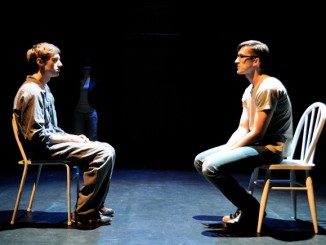
[Shakespearean Aspirations]
The main drawcard for Ash Jones’ Thomus is his use of iambic pentameter, drawing inspiration from the humble likes of Shakespeare. While not completely unheard of in recent theatrical endeavours (Mike Bartlett’s King Charles III being a prime example), it’s a lofty ambition worthy of respect in itself. That face he does it so confidently is the most impressive aspect though, and a further credit to his skill and talent as a new playwright.
Not to gush, but Jones is able to weave the classical and contemporary effortlessly, where each side of the writing lifts the other up. The very ordinary storylines of marital strife, high school romance and petty crime are elevated to grandiose proportions through the poetry, and the poetry made accessible and humorous through the banality of modern life.
Despite the additional influence of David Lynch, the storyline is relatively straightforward: framed as a coming-of-age story, titular Thomus (Milo Cawthorne) struggles with the disintegrating marriage of his parents (Michelle Leuthart and Paul Ballard), resorting to petty criminal activity with a gang of thieves (Bruce Hopkins, Arlo Gibson and Oliver Cox) and high school romance (Amelia Reynolds) for solace.
But where Jones has nailed the musicality of the language, the storytelling occasionally lets him down. The plot tends to operate better as a vehicle to deliver us the poetry rather than a narrative that stands on its own legs. The marital drama, for instance, relies on some pretty tired tropes (the shrew wife versus the cuckolded husband). Leuthart and Ballard tackle the verse admirably though, spitting the appropriate amount of venom and anger while maintaining the necessary eloquence required for the words.
As the trio of petty thieves, Hopkins leads the pack as a Falstaff figure, able to shift from charming vagrant to sociopath in the blink of an eye. Gibson and Cox accompany him to provide some amusing but repetitive comic relief. All three of them deliver their lines masterfully with a distinctly classical air.
The most consistent joys of the show are the interactions between Cawthorne and Reyonlds. Not burdened with the machinations of plot, we’re simply allowed to enjoy the hearty banter between the adolescent couple as their relationship grows. Both actors tap into the poetic and prosaic rhythms of their lines, one minute channeling Benedick and Beatrice, and the next minute Cary Grant and Rosalind Russell. Cawthorne also has to carry the entire show on his shoulders, which isn’t easy when you’re playing a modern day Hamlet, but he balances existential angst with just the right amount of wit.
As director, Jones serves his own play well, but there’s potential for additional world-building; currently the three storylines don’t feel as though they inhabit the same play, with Thomus being the flimsy glue that binds the play together. If this is meant to be intentional, further exploration and transgression is necessary. At the moment, it neither feels fractured or cohesive enough. The scene transitions are also quite cumbersome, slowing down the show to an awkward halt. Some of these are saved by the cast doubling as stagehands and knowingly breaking the fourth wall, but they also draw attention away from the scenes themselves.
Andrew Foster’s haunting set and lighting design does well to compensate for some of these issues, unifying the space of the play with a series of continuously illuminating lamps as well as well as a backdrop of eyes. And it’s here in the design elements that the Lynch homage is most recognisable, particularly in a moment of AV that seems to nod directly to Lost Highway, filling the space with a surreal suspense. Tom Dennison and John Gibson’s sound design is also appropriately eerie when necessary.
Though uncredited with a specific role in the programme, Nisha Madhan’s influence and inspiration is undeniable (pick up a copy of the Thomus correspondence from the box office) as a surrogate dramaturge for the entire process. Beyond being one of Auckland’s most vital theatremakers, she’s quickly becoming an important fixture for developing young talents too.
For all its endearing qualities, Thomus is a play that begs for some judicious editing. Running close to an hour and fifty minutes, the show begins to lose steam despite the spitfire delivery and energetic performances from its cast. The last act, in particular, crawls too slowly to its inevitable climax. And the greatest asset of the play, the language, risks becoming the very thing working against it.
Still, it’s a show well worth seeing. It’s not only a remarkable achievement for a first-time playwright, but a remarkable achievement for any writer. This is a contemporary twist on Shakespearean verse that rises beyond a mere gimmick. Every line is a protest against naturalism and subtext, a gloomy celebration of excess. If it’s an occasionally demanding show with an overlong duration, it’s one that rewards patience.
Thomus plays at The Basement until 10th September. Details see The Basement.




Leave a Reply